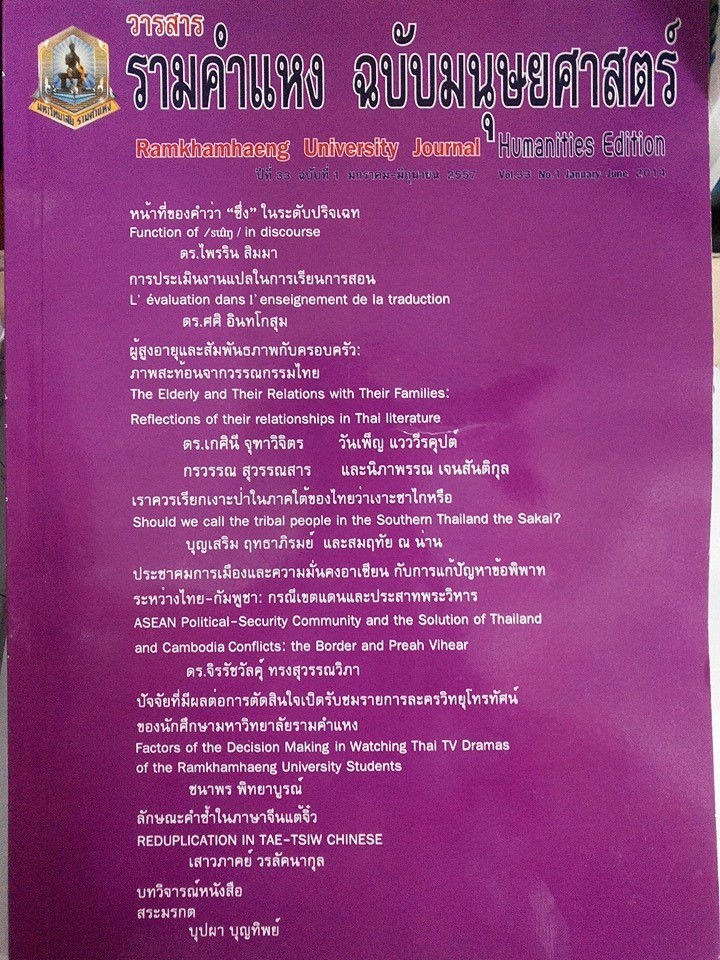ผู้สูงอายุและสัมพันธภาพกับครอบครัว: ภาพสะท้อนจากวรรณกรรมไทย The Elderly and Their Relations with Their Families: Reflections of their relationships in Thai literature
Main Article Content
บทคัดย่อ
บทคัดย่อ
งานวิจัยนี้มีวัตถุประสงค์เพื่อวิเคราะห์เนื้อหาวรรณกรรมไทยและประกอบสร้างภาพสะท้อนวิถีชีวิตของผู้สูงอายุและสัมพันธภาพกับครอบครัว โดยใช้วิธีการวิเคราะห์เนื้อหา การตีความและการสนทนากลุ่ม ตัวบทที่ใช้ในการศึกษา ได้แก่ นวนิยายและเรื่องสั้น จำนวน 50 เรื่อง ผลการศึกษาพบว่า แก่นเรื่องที่พบมากที่สุด ได้แก่ ความขัดแย้งและการจัดการความขัดแย้งระหว่างคนต่างวัยในครอบครัว แนวเรื่องส่วนใหญ่เป็นแนวสัจนิยมที่สะท้อนวิถีชีวิตของผู้สูงอายุที่เรียบง่ายและวนเวียนอยู่กับกิจกรรมเดิม ๆ พฤติกรรมสังคมและงานอดิเรกมักเป็นงานเบา ๆ ตามความถนัดและความสนใจ มีเพียงส่วนน้อยที่สนใจเรื่องการทำบุญและฟังธรรมเทศนา ในด้านบุคลิกภาพนั้น แม้ว่าส่วนใหญ่จะมีบุคลิกภาพที่น่าอบอุ่นและน่าไว้วางใจ แต่สัมพันธภาพระหว่างผู้สูงวัยกับผู้อ่อนวัยมักไม่ใช่สัมพันธภาพทางบวก ถึงกระนั้นความสัมพันธ์ที่ดีนี้สามารถพัฒนาได้ โดยการให้อภัย การให้ความรักและความจริงใจ ความสุขของผู้สูงอายุคือ การได้เห็นความสำเร็จในชีวิตของลูกหลาน การมีความรักความอบอุ่นในครอบครัว การได้เลี้ยงดูอบรมลูกหลาน การมีสุขภาพแข็งแรงสมบูรณ์และการเข้าถึงธรรม ส่วนความทุกข์ที่สำคัญคือ ความอ้างว้างเดียวดายและการยึดติดกับอดีต
Abstract
This research aims to analyze the content of Thai literary works in order to illustrate elderly people’s ways of life and their relationships with their families. The research employed content analysis, interpretation, and focus group discussion to investigate a total of 50 novels and short stories. This study found that the most frequent themes were conflict and conflict management between younger and older generations in the family. The largest number of plots found in this study revealed a realistic approach that reflects the simple way of life of the elderly, as they engage in routine, typical activities such as socializing and taking part in hobbies, usually with other people of their age who have similar interests. Furthermore, the story lines indicated that a number of elderly people paid attention to merit making and sermons by monks. Although their personality was usually presented as reliable and warm, their relationships with younger generations were displayed in a relatively negative manner. The stories, however, showed that such negative relationships could be improved with forgiveness, love, and sincerity. Happiness for the elderly is seeing their children’s success, having love and warmth in their families, being healthy, being able to take care of their children’s children, and having access to Dharma teachings, while their great miseries are loneliness and living in the past.
Article Details

อนุญาตภายใต้เงื่อนไข Creative Commons Attribution-NonCommercial-NoDerivatives 4.0 International License.
ประกาศลิขสิทธิ์จะปรากฏในเกี่ยวกับวารสาร ควรอธิบายสำหรับผู้อ่านและผู้เขียนว่าเจ้าของลิขสิทธิ์เป็นผู้เขียนวารสารหรือบุคคลที่สาม ควรรวมถึงข้อตกลงการอนุญาตเพิ่มเติม (เช่นใบอนุญาตครีเอทีฟคอมมอนส์) ที่ให้สิทธิ์แก่ผู้อ่าน (ดูตัวอย่าง) และควรให้วิธีการรักษาความปลอดภัยหากจำเป็นสำหรับการใช้เนื้อหาของวารสาร


